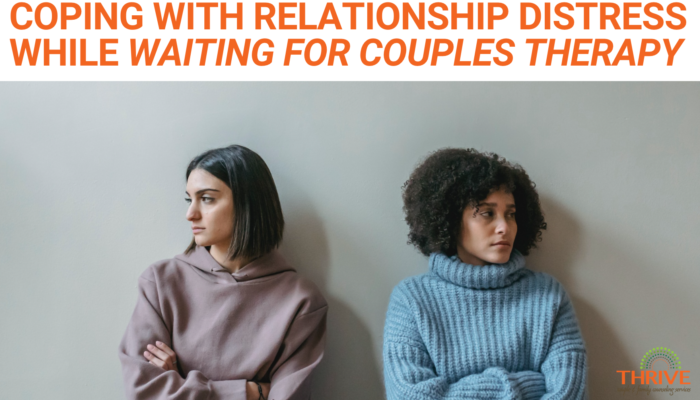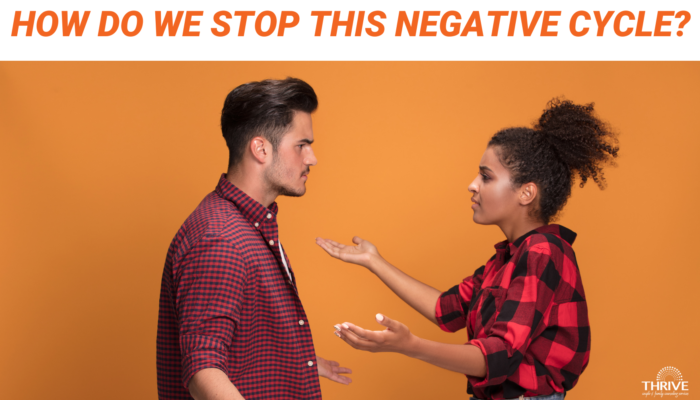Think back to the last time you and your partner had a serious disagreement. How did you feel during that time? Probably terrible, right? It feels awful to have conflict in our closest relationships. Why is that?
As humans, we are wired for connection. If you consider what life was like for early humans it makes sense – we needed to rely on each other to literally, physically survive the world. We are built to seek connection and community, because they help us fulfill important needs. When our close relationships feel threatened, it can feel completely destabilizing.
Not only are we wired to connect with other people, we also have attachment needs that stem from our early relationships with our caregivers. Attachment needs are basic truths about ourselves – to believe that you matter, that you are loved and accepted, that you aren’t a burden, that you won’t be abandoned.
Where is my relationship distress coming from?
When those attachment needs are threatened, it can make you feel like you did when you were a child being let down by your caregivers. That can be a tremendously painful experience. When pain like that comes up, it feels awful. Most of us will do anything we can to stop feeling that pain.
When we feel like these needs aren’t being met by our partners, it can lead to conflict because our instincts compel us to respond to the fears we feel inside. Our reactions don’t always result in reassurance, and in fact, they can actually fuel conflict! It can feel really scary to feel like your partner might abandon you, or that you aren’t heard in a relationship and so of course, we react, but not always in ways that get our needs met. We call this the negative cycle.
The negative cycle
The ways we try to stop the feelings of pain and disconnection often contribute to what’s called the negative cycle in relationships. In Emotionally Focused Therapy (EFT), we recognize that every relationship has an unhelpful pattern, or negative cycle, that contributes to disconnection. Someone reacts, then their partner reacts to that, and around it goes, leaving you both feeling rotten.
When you remember that relationship conflict often springs up in response to our attachment needs not being met, it can feel easier to have empathy for your partner. Remember how it felt the last time you felt threatened in your relationship? In many cases, your partner is also following the script that they know to relieve that pain. Fortunately, there is another way. You can both learn to spot the negative cycle when it comes up and respond to each other in more supportive ways.
What if we’re waiting for couples therapy?
Remember, couples therapy isn’t a magic wand. Attending will not be the only thing that makes a difference in your relationship because therapy requires commitment and practice outside of the therapy room.
Couples therapy can be a fantastic way to learn more about your relationship’s negative cycle, how to explore the needs that are beneath the surface, increase empathy for one another, which can be transformational to relationships.
Couples therapy, however, isn’t the only way that we can improve our relationships. There are things you can do outside of couples therapy or while you’re waiting for couples therapy to help improve your relationship right now instead of having to wait.
Why are couples waiting for couples therapy?
There are lots of reasons why couples might be waiting for couples therapy immediately when distress comes up in their relationship.
- Lack of openings
- We are in a mental health crisis right now, which has been exacerbated by the pandemic. What that means for a lot of people is they’re finding that all the counselors in their area have long waiting lists or aren’t taking new clients.
- This can feel really frustrating when you’re looking for help, even though it’s not something with an easy fix, so many couples are still waiting for couples therapy.
- Specialties you’re interested in are scarce
- Certain types of couples therapy and therapist specializations will work better for some folks than others. If there’s a specialty that you are interested in, it can be tricky to find a therapist with that specialty in your area sometimes, especially if you live in a more rural area.
- For example, we HIGHLY recommend that couples seek therapy from therapists with ongoing specialty training in couples therapy. That narrows the pool considerably since other therapists might specialize in other things or consider themselves “generalists” which we don’t recommend for the complexity of couple therapy needs.
- Stigma
- Although it’s a very positive sign in terms of mental health stigma that more people than ever are seeking mental health help, there is still a stigma when it comes to seeking mental health care. Some people require a lot of convincing to attend couples therapy because of misinformation about how the process works.
- It’s normal to have fears about whether seeking couple therapy means you’re failing. You’re not. In fact, getting help can be one of the best things you can do to prevent your relationship falling apart and is an incredibly loving and brave thing to do for your partner.
- Cost
- With everything getting more expensive these days, it can be hard to find extra money in your budget for couples therapy, even if it’s important to you. Even if you have health insurance, it might be tricky to find a provider who accepts your insurance and has an opening in some places. Luckily, here at Thrive, we have a variety of therapist fee levels based on experience, including some low cost alternatives with our Graduate Student Interns to give options to folks who are waiting for couples therapy.
- Also, sometimes people vastly underestimate the costs of lost work productivity, the toll on physical health and the high financial cost of relationship distress or ending, especially when divorce and children are involved. The research is clear: children fare better, our health is better, we live longer, and we are more productive overall when our attachment needs are being met in secure relationships.
- Time
- It might be difficult to figure out scheduling when you have two busy people to accommodate. Taking time off work to go to therapy might not be an option, and when one or both of you works an off shift, coordinating regular meeting times can be a nightmare.
Remember, couples therapy isn’t the only way to improve your relationship. If you and your partner waiting for couples therapy or can’t attend therapy right away, there are still things you can do to improve your relationship in meaningful ways. Here are some ideas to get you started:
Learn more about relationships
There is so much helpful information out there about relationships and how to improve them. If you and your partner are up for it, give yourselves some homework to learn more about how relationships work and what gets in the way of good ones while you’re waiting for couples therapy.
You can likely find books at your local library or through the Libby app if you’d like to borrow them digitally. Subscription apps like Scribd can also give you access to hundreds of relationship focused books with a monthly fee, or if you’re into audiobooks an Audible subscription might be more helpful.
Reading self-help books might not seem exciting at first, but learning more about yourself and your relationship through what you read is invaluable. There are also so many helpful podcasts out there if listening is more your thing.
It might be helpful to learn more about attachment styles or love languages so you can see where your disagreements stem from. Get in the habit of learning more about relationships and the way you relate to each other!
If you’re looking for some books and podcasts to get you started, here are some our Emotionally Focused Couples Therapists recommend:
Books:
- Hold Me Tight: Seven Conversations for a Lifetime of Love by Dr. Sue Johnson
- Coming 12/13/22: The Hold Me Tight Workbook: A Couple’s Guide for a Lifetime of Love by Dr. Sue Johnson
- Love Sense: The Revolutionary New Science of Romantic Relationships by Dr. Sue Johnson
- Attached: The New Science of Adult Attachment and How It Can Help You Find – and Keep – Love by Amir Levine and Rachel Heller
- Couples Therapy Workbook for Healing: Emotionally Focused Therapy Techniques to Restore Your Relationship by Lori Cluff Schade PhD, LMFT
Podcasts:
- The Love, Happiness, & Success Podcast
- We Heart Therapy Podcast
- That Relationship Show
Make time for each other
While you’re working on your relationship, it’s important to spend quality time together. Quality time means without any other distractions – chores, screens, kids. How can you increase the amount of quality time you spend together?
This can seem impossible to do when you feel disconnected or upset with your partner.
Remember that things didn’t always feel this way, and they won’t always feel this way. Remind yourself that you are empowering yourself to learn more about relationships and that you’re both doing your best to repair your connection. Try to summon some of that empathy for where your partner is coming from so you can feel more connected to them.
A helpful tool you can use to help acknowledge and validate each other is the Relationship Temperature Check, which you can learn more about here. Set aside time regularly to check in with each other to make sure you’re on the same page, instead of letting things build up and cause resentment.
Try a workshop or intensive
Sometimes, our counseling practice becomes full and we aren’t able to take on new clients. We can still be a resource for you through our couples intensives and sometimes through Hold Me Tight couples workshops. These can give you an opportunity to discuss your goals for therapy and to work on specific issues that contribute to your relationship disconnection.
There are Hold Me Tight workshops across the country that are based on the book (linked above), and many therapy practices (including ours) can offer more information on this.
An intensive for couples is a one or two day long experience which can consist of couples therapy sessions and individual sessions, with breaks in between. An intensive can be a good fit for couples who have a tough time scheduling regular therapy appointments, and can give you helpful tools to use when distress comes up in your relationship in the future.
Have outlets outside of your relationship
Not only is it important to spend time with your partner, it’s also important to not spend all of your time with your partner. Everyone needs outlets outside of their relationship, because it’s not feasible to have one person meet all of our needs. As discussed previously, we are social creatures, and we innately crave connection with others. Do what you can to foster your relationships outside of your romantic relationship. Maybe make time for a regular dinner with friends, or call your mom on your way home from work on Thursdays.
Reminding yourself that there are other relationships in your life that aren’t causing you distress can be comforting when you’re experiencing conflict in your romantic partnership.
Cultivating hobbies and interests separate from your partner can also be a valuable experience. At the very least, it will give you something new to talk about with your partner, and you might find something you really enjoy. Making time for the things that you are passionate about and the people who you care about lets you live a life that’s aligned with your values and allows you to build up your support network.




